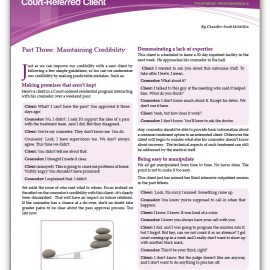Articles
Mindfulness
You can be mindful about everything. The next time you go to the grocery store and you pick up those red apples, think about the time it took for those apples to grow, who picked them, and where they came from.
Topics: mindfulness, Recovery Tools, relaxation, stress, tools for recovery
Defense: Externalization
Eventually, through painful experience, the externalizer recognizes that the secret of recovery is focusing on changing yourself, not others.
Topics: Alcoholic Defenses, defense mechanisms, intervention
Defense: Rationalization
Eventually, the rationalizer (through painful experience) realizes that instead of serving as a remedy, drugs and alcohol are actually making problems worse
Topics: Alcoholic Defenses, defense mechanisms, intervention
Critical Thinking
At one time, critical thinking skills were a required part of education in many schools. I have the impression that’s no longer the case. Too bad, because faced with a flood of contradictory arguments, we need them more than ever.
Topics: communication, Effective Communication with An Addicted or Alcoholic Person, negotiation
Tools for Recovery
Once the support of the treatment program no longer surrounds you, dealing with life’s challenges can be overwhelming. That’s when tools for recovery count.
Topics: maintaining sobriety, Recovery Tools, tools for recovery
Calm as a Tool for Better Living
Calm is a tool we learn to use so that we can deal more successfully with life and the problems we all face.
Topics: Recovery Tools, relaxation, tools for recovery
We All Need Boundaries
It might be a friend, or a colleague. Maybe an ex, or a sort-of relationship. Might be a relative who doesn’t live with you. In any case, their problems are draining YOU of energy and time, and the stress is mounting. It’s a toxic relationship.
Topics: boundaries, co dependency, family dysfunction, toxic relationships
Defense: Intellectualizing
Eventually, things get so bad that the details become irrelevant and the objections seem unimportant.
Topics: Alcoholic Defenses, defense mechanisms, intervention
Using Leverage in Counseling the Court-Referred Client, Part 3
Clients will test boundaries just to see what will happen when they do. If you’re prepared for such tests, and can avoid some predictable errors in response, you’ll find that the course of treatment runs smoother.
Topics: client engagement and motivation, counseling skills, DUI/DWI, leverage, Using Leverage Series
















